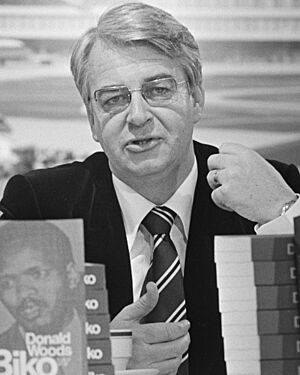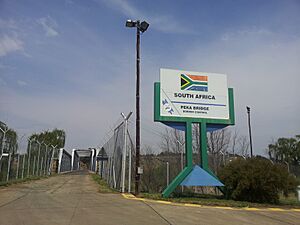Donald Woods facts for kids
Quick facts for kids
Donald Woods
|
|
|---|---|

Woods in 1978
|
|
| Born |
Donald James Woods
15 December 1933 Hobeni, Cape Province, Union of South Africa
|
| Died | 19 August 2001 (aged 67) London, England
|
| Occupation |
|
| Spouse(s) | Wendy Woods |
Donald James Woods (born 15 December 1933, died 19 August 2001) was a brave South African journalist. He was also an activist who fought against apartheid. Apartheid was a system in South Africa that separated people by race and treated them unfairly.
Woods was the editor of a newspaper called the Daily Dispatch. He became good friends with another activist, Steve Biko. Steve Biko was sadly killed by the police after being held by the South African government. After this, Woods continued his fight against apartheid from London. In 1978, he became the first private citizen to speak to the United Nations Security Council.
Contents
Growing Up in South Africa
Donald Woods was born in Hobeni, a place in what is now the Eastern Cape province of South Africa. His family had lived there for a very long time, for five generations. His ancestors came to South Africa from England and Ireland in the 1820s.
Donald grew up speaking Xhosa and Afrikaans, as well as his first language, English. His parents ran a trading post in a tribal area called Transkei. This meant Donald had a lot of contact with the Xhosa people from a young age.
He went to high school in Kimberley. While he was away at school, the National Party came to power in 1948. This party started to build the strict system of apartheid.
When Woods began studying law at the University of Cape Town in 1952, he first supported some government policies that separated races. However, he soon started to question these ideas. He became active in a political party that was against apartheid.
Becoming a Journalist
Woods first trained to be a lawyer. But he soon found that journalism was his true calling. He started as a young reporter for the Daily Dispatch newspaper in East London.
For two years in the late 1950s, he worked for newspapers in England and Wales. He learned a lot about journalism during this time. He even became a correspondent for a London newspaper. He traveled to the United States and wrote stories comparing racial separation there to apartheid in South Africa.
Woods returned to the Daily Dispatch and married Wendy Bruce. They had six children together. In 1965, when he was 31, Woods became the editor-in-chief of the Daily Dispatch. The newspaper was known for being against apartheid.
As editor, Woods wanted more people to read the Dispatch. He wanted to reach Afrikaans-speakers and black readers. He also made sure that black, white, and coloured reporters worked together in the same office. This was against apartheid rules. Woods often challenged the government's strict rules about the press.
Friendship with Steve Biko
Under Donald Woods's leadership, the Daily Dispatch was very critical of the South African government. At first, the newspaper was also critical of the new Black Consciousness Movement. This movement was led by Steve Biko.
Steve Biko's partner, Mamphela Ramphele, told Woods that his stories about the movement were wrong. She encouraged him to meet with Biko. The two men met and quickly became good friends.
Because of their friendship, the Security Police started watching Woods closely. But Woods continued to support Biko. He wrote strong editorials in his newspaper. He also bravely hired black journalists to work at the Daily Dispatch.
In 1976, a big student protest happened in Soweto. Students, many of them teenagers, marched to protest being taught in Afrikaans. They also protested the unfair education system. The police opened fire on the students, killing many.
The government reacted by banning the Black Consciousness Movement. They also issued "banning orders" against many people. A banning order was a strict government rule that stopped someone from speaking, writing, traveling, or working. Donald Woods was one of the people who received a banning order. This meant he was effectively placed under house arrest.
On 12 September 1977, Steve Biko died after being arrested and badly beaten by police. Woods went to the morgue with Biko's wife. He took photographs of Biko's injured body. These photos were later published in Woods's book. They showed the world that the South African government was lying about how Biko died.
Escape to Freedom
Soon after Biko's death, Donald Woods was given a five-year banning order. He lost his job as editor. He was not allowed to speak publicly, write, travel, or work. Over the next year, he faced more and more harassment. His phone was tapped. His young daughter was even hurt by a T-shirt that had been poisoned.
Woods became convinced that the government was trying to kill him. He decided he had to escape from South Africa.
Woods and his friends planned a secret escape. On 30 December 1977, Woods disguised himself as a Roman Catholic priest. He hitchhiked out of town and then drove a long distance. He tried to cross the Tele River into Lesotho, a neighboring country. But the river was flooded.
So, he crossed at the Tele Bridge border crossing. He rode in a postal truck driven by a man who didn't know Woods was escaping. Woods made it into Lesotho without being caught by South African officials. His family joined him there soon after.
With help from the British and Lesotho governments, Woods and his family flew to London. They were given political asylum there. This meant they could live safely in the United Kingdom.
Fighting Apartheid from Exile
After arriving in London, Woods became a strong voice against apartheid. He followed the advice of Oliver Tambo, a leader of the African National Congress (ANC). Woods became a passionate supporter of countries putting sanctions on South Africa. Sanctions are rules that stop countries from trading with another country. This was meant to pressure South Africa to end apartheid.
He traveled to the United States to campaign for sanctions. He even spoke to officials in the U.S. government. In 1978, Woods spoke at a meeting of the United Nations Security Council.
On 11 February 1990, Nelson Mandela was released from prison after 27 years. That Easter, Mandela came to London. He attended a concert to thank everyone who had fought against apartheid. Woods gave Mandela a special tie with the colours of the African National Congress. Mandela wore it at the concert the next day.
Returning Home
Woods returned to South Africa in 1994. He helped raise money for the ANC's election campaign. On 27 April 1994, Woods went to vote in Johannesburg. It was the first democratic election in South Africa. A cheering crowd let him go to the front of the line. He was one of the first people to vote in the new, free South Africa.
After the election, Woods worked for an organization that helped journalism in Johannesburg.
On 9 September 1997, 20 years after Steve Biko's death, Woods was in East London. A statue of Biko was unveiled by Nelson Mandela. A bridge was also renamed the "Biko Bridge." Woods continued to support events honoring Biko.
Cry Freedom Film
The story of Donald Woods and Steve Biko was made into a film called Cry Freedom. The famous director Richard Attenborough filmed it. The movie was based on books that Woods had written.
Donald and Wendy Woods worked closely with the actors and crew. The film was mostly shot in Zimbabwe because South Africa was still under apartheid. It was released in 1987 and was very popular.
Kevin Kline played Donald Woods in the film. He became good friends with Woods and his family. Penelope Wilton played Wendy Woods. Denzel Washington played Steve Biko and was nominated for an Oscar for his role. The film also showed how many black activists died while in police custody in South Africa.
Later Life and Legacy
In his last year, Woods supported a campaign to build a statue of Nelson Mandela in Trafalgar Square in London. This was a place where many anti-apartheid protests had happened.
Donald Woods was honored with the title of Commander of the Order of the British Empire (CBE) in 2000. He died of cancer on 19 August 2001 in London.
The bronze statue of Nelson Mandela was later put up in Parliament Square. It was unveiled in 2007 by the British Prime Minister. Woods's wife, Wendy, Nelson Mandela, and Richard Attenborough were all there.
Wendy Woods passed away in 2013.
Donald Woods's eldest son, Dillon Woods, now leads the Donald Woods Foundation. This foundation helps with education and health in South Africa.
Awards and Recognition
- Conscience-in-Media Award, from the American Society of Journalists and Authors, in 1978
- World Association of Newspapers' Golden Pen of Freedom Award, in 1978
Memorials
- Donald Woods Gardens – A street in Tolworth, Surrey, England.
- Donald Woods Foundation – An organization that helps with HIV/AIDS management in rural South Africa.
Works
- Filming with Attenborough
See also
- List of people who took refuge in a diplomatic mission
 | James B. Knighten |
 | Azellia White |
 | Willa Brown |


